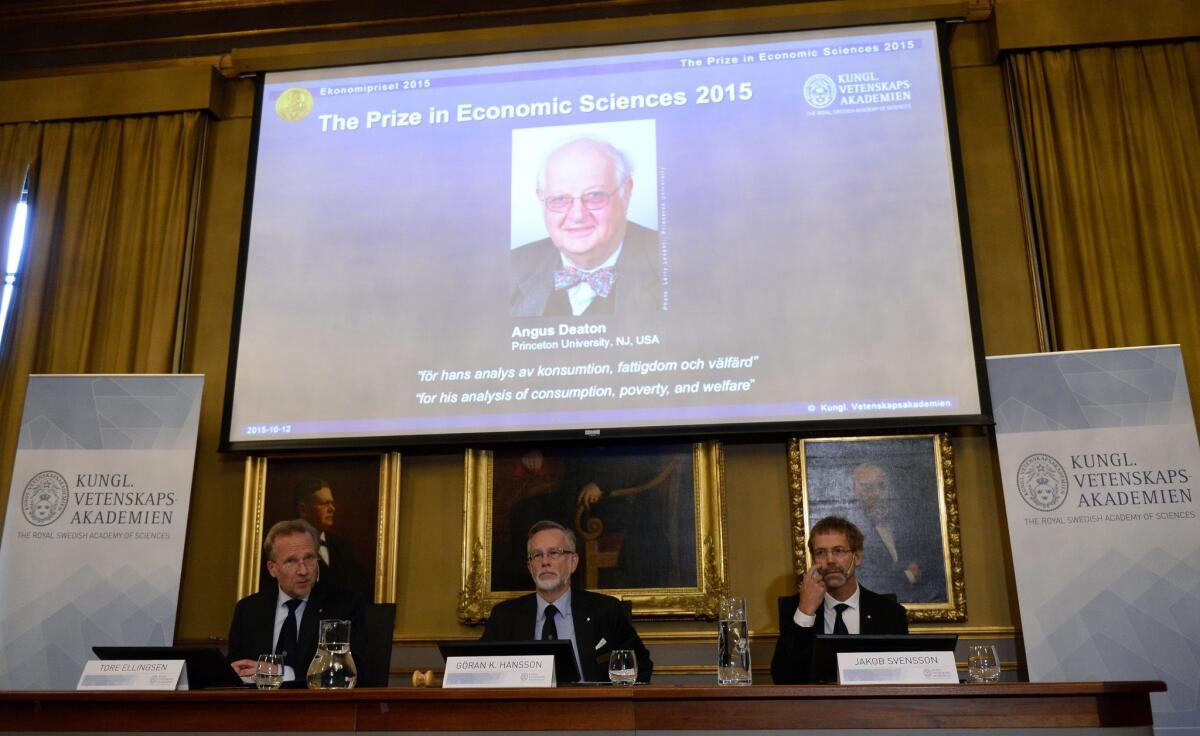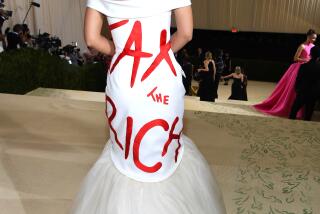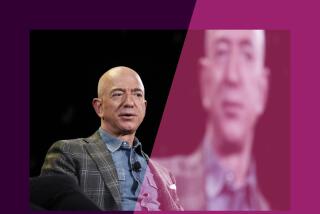Princeton professor is gratified Nobel in economics recognizes his research on poverty

Officials from the Royal Swedish Academy of Sciences announce Angus Deaton, a Princeton economics professor, as the winner of the 2015 Nobel prize in economics.
The study of poverty and economic development has been a tricky field, rife with measurement problems and difficulties squaring theory with real-life patterns of consumption and income.
Over the last few decades, Princeton University professor Angus Deaton has answered some of these puzzling questions and generally expanded the understanding of consumption and development economics -- and for this, the Scottish-born economist was awarded the prestigious Nobel prize in economics on Monday.
One of Deaton’s most important contributions is his work on the individual consumption choices that people make and how those can help explain why consumer spending, for example, may not grow as much as expected when aggregate incomes are rising. The answer is that individual incomes and consumption fluctuate in an entirely different way than average or total numbers.
“By linking detailed individual choices and aggregate outcomes, his research has helped transform the fields of microeconomics, macroeconomics and development economics,” the Nobel committee said in awarding the prize, worth almost $1 million this year.
Deaton, 69, a dual U.S. and British citizen, has applied his insights to explore a wide range of areas in poverty with significant policy implications. His research has shown that malnutrition is largely the consequence of a low income, but not the other way around.
At the same time, Deaton has also found exception. Despite India’s rapid economic growth over the last two decades, the average caloric intake has actually dropped. In a lecture last year in London, he said what may explain this seeming contradiction is that as economic progress has eased back-breaking farm work, poor people have needed fewer calories to sustain their activity.
Deaton has also analyzed gender discrimination within the family, an area particularly relevant to countries such as China with its one-child policy.
Employing what the Nobel committee called an “ingenious way of using household consumption data,” Deaton was able to estimate whether daughters were given less than sons. His conclusion was that there weren’t any systematic differences under normal circumstances, but he later found that there was discrimination in adverse situations.
Despite working in a field in which poverty reduction has been stymied by politics and income inequality, the avuncular professor has been far from dystopian about the progress made in human development and welfare. In a telephone interview with the Nobel committee in Sweden, where the award was announced, he said Monday that things were getting better, echoing the optimistic theme in his book published last year called “The Great Escape.”
Still, he said: “You have to keep remembering that we are not out of the woods yet and that for many, many people in the world, things are very bad indeed.” And he added: “I think the current upwards trends in inequality are very worrying in many contexts around the world.”
Deaton said he was sleepy when he got the call. “I’m absolutely delighted,” he told the committee. Deaton said he was particularly pleased that research “concerned with the poor of the world, how they behave and what gives them a good life” was being recognized.
Last year the Nobel prize in economics was awarded to French economist Jean Tirole for his research on how large firms should be regulated to prevent consumers from being hurt by their monopolistic power.
The economics award, officially called the Sveriges Riksbank Prize in Economic Sciences in memory of Alfred Nobel, was created in 1969 to celebrate the 300th anniversary of the Bank of Sweden, the world’s first central bank.
Twitter: @dleelatimes
MORE ON THE 2015 NOBEL PRIZE WINNERS:
Nobel Peace Prize goes to civil groups that kept democracy alive in Tunisia
Svetlana Alexievich wins Nobel Prize in Literature
Nobel Prize in medicine goes to 3 scientists for work on parasite-fighting therapies







